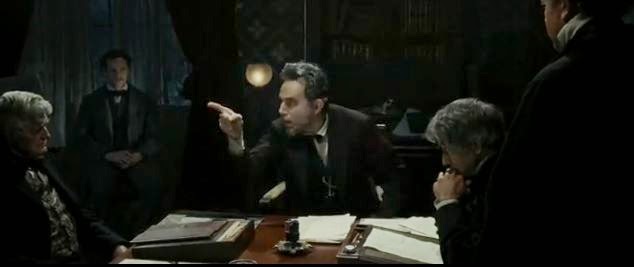In my last semester of college, I completed a writing portfolio entitled "Exploring Modern American Culture through Contemporary Cinema." It contained four essays dissecting four recent films. The third essay examined how Steven Spielberg's Lincoln portrayed the 16th president of the United States. The third part of that essay is below. I will post a new portfolio excerpt every day. Previous posts: The Dark Knight - Part One, Part Two, Part Three, Part Four; (500) Days of Summer - Part One, Part Two, Part Three, Part Four; Lincoln - Part One, Part Two.
Lincoln: Beyond the Myth
Dirty Politics or Political Prowess?
Dirty Politics or Political Prowess?
More controversial than the portrayal of the president’s
peculiarities is Lincoln’s depiction
of Honest Abe as a crafty statesman. The film shows the passing of the 13th
Amendment as being dependent upon unscrupulous practices. Lincoln knows that
accomplishing his goal of abolishing slavery will be an uphill battle. There
are simply too many people either opposed to the amendment or too afraid to
vote “yes.” To procure the necessary votes, Lincoln enlists three lobbyists to
bribe Congressmen with the promise of future patronage jobs. This picture of
Lincoln as a vote-buyer – getting his hands dirty like so many other
politicians in history – may surprise many contemporary viewers who regard him
as one of uncontaminated integrity. In addition to this image-shaking depiction
of Lincoln, the film shows the president as an assertive leader who is not
afraid to push the limits of what he can get away with, if it is for a good
cause. Specifically, Lincoln shows
him using special wartime powers to move the amendment vote forward, a decision
he knows not all his constituents will appreciate. It is a blatant attempt to
get the law passed at all costs. He is accused of abusing his position by some,
though now, about 150 years later, many ignore or are not even aware of the
questionable tactics he used. Some who do know of the 13th Amendment’s true
journey do not care, as today it is widely accepted that the end result was worth
the unfavorable means (Adkins 212).
The film not only acknowledges Lincoln’s politicking, but respects
it, too. Spielberg and screenwriter Tony Kushner do not approach their subject
with wagging fingers and harsh reprimands. Lincoln’s
perspective on politics is summed up by high-minded abolitionist Thaddeus
Stevens (Tommy Lee Jones) when speaking to a fellow Radical Republican.
Frustrated by his colleague’s skepticism toward Lincoln, Stevens barks, “Trust?
Oh, I’m sorry. I was under the misapprehension your chosen profession was
politics” (Spielberg). This is a messy field, and as president, Lincoln is in
it deeper than most. He has to make some of the most important decisions in
United States history at a time when deep-seated division threatened to tear
the country apart forever. He uses his cunning mind and charismatic goodness to
do what is right. In the end, “the greatest measure of the 19th century [is]
passed by corruption and aided and abetted by the purest man in America,” the
legendary Abraham Lincoln (Spielberg).
For modern Americans, this may mean reevaluating the historical
figures they use as the gold standard for moral leadership. The film’s
portrayal of Abraham Lincoln contradicts the idea that the great leaders of the
past were somehow incorruptible and immune to the lion’s den that is
Washington, D.C. Even if audiences are not using the past as a means to justify
their opinions of the present, it is likely they are feeling cynical about
politics. Analysts have noticed a trend toward distrust of or apathy toward the
political process. According to Trey Garson, director of the Institute of
Politics at Harvard University, the focus on “petty partisan politics” instead
of “big issues” has led to disenchantment with the government, particularly
among Millennials (Stolberg). If Lincoln
is treated as a document of history, it could serve as a source of hope for a
disillusioned public. The era depicted in the movie is one with arguably the
greatest disunity the United States has ever known. As shown in Lincoln, the North and South were at
war, and Northerners were at odds over how to bring the nation back together.
If Abraham Lincoln, an honorable man and skillful politician, could help lead
the U.S. through that time, perhaps it is possible for someone today to help
the nation through these far less dire but nonetheless divided times.
Sources
Adkins, Jason A. "Lincoln's Constitution Revisited." Northern
Kentucky Law Review. 36.2 (2009): 211-50. Print.
Spielberg, Steven, dir. Lincoln.
Writ. Tony Kushner, Perf. Daniel Day-Lewis, Sally Field, and Tommy Lee Jones.
Touchstone Pictures, 2012. Film. 1 Nov 2013.
Stolberg, Sheryl Gay. "For ‘Millennials,’ a Tide of Cynicism
and a Partisan Gap." New York Times
29 April 2013, n. pag. Web. 2 Nov. 2013.

No comments:
Post a Comment